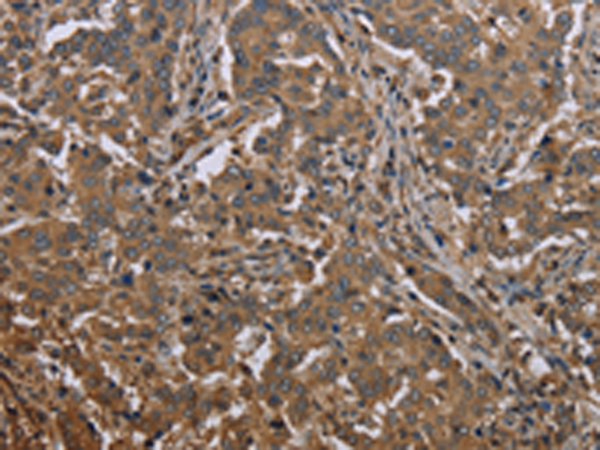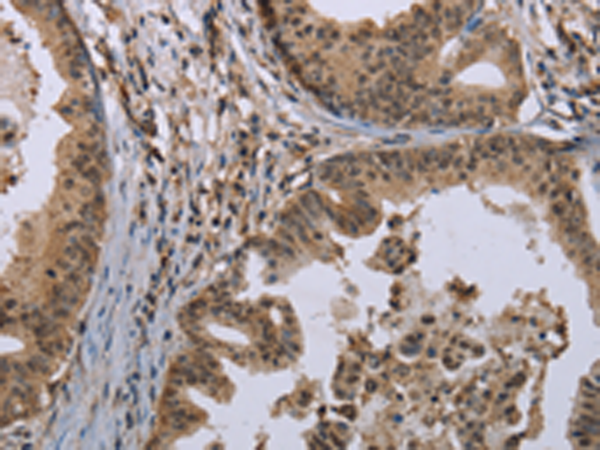

| WB | 咨询技术 | Human,Mouse,Rat |
| IF | 咨询技术 | Human,Mouse,Rat |
| IHC | 1/50-1/200 | Human,Mouse,Rat |
| ICC | 技术咨询 | Human,Mouse,Rat |
| FCM | 咨询技术 | Human,Mouse,Rat |
| Elisa | 1/2000-1/5000 | Human,Mouse,Rat |
| Aliases | MCC1 |
| Host/Isotype | Rabbit IgG |
| Antibody Type | Primary antibody |
| Storage | Store at 4°C short term. Aliquot and store at -20°C long term. Avoid freeze/thaw cycles. |
| Species Reactivity | Human |
| Immunogen | Synthetic peptide of human MCC |
| Formulation | Purified antibody in PBS with 0.05% sodium azide and 50% glycerol. |
+ +
以下是关于Merkel细胞癌(MCC)抗体的3篇参考文献及其简要摘要:
---
1. **文献名称**:*Merkel Cell Carcinoma: Diagnosis, Prognosis, and Management*
**作者**:Bobos M, et al. (2021)
**摘要**:
该综述总结了MCC的诊断标志物,强调抗细胞角蛋白20(CK20)抗体和神经内分泌标记物(如嗜铬粒蛋白A、突触素)在组织病理学中的关键作用,并讨论了抗体检测对肿瘤分期和预后的意义。
---
2. **文献名称**:*Merkel Cell Polyomavirus and Merkel Cell Carcinoma: A Systematic Review and Meta-Analysis*
**作者**:Becker JC, et al. (2008)
**摘要**:
研究证实Merkel细胞多瘤病毒(MCPyV)与MCC的关联,利用病毒大T抗原抗体检测约80%病例中的病毒DNA,提示抗MCPyV抗体在病因学研究和临床诊断中的价值。
---
3. **文献名称**:*PD-1 Blockade with Pembrolizumab in Advanced Merkel Cell Carcinoma*
**作者**:D'Angelo SP, et al. (2018)
**摘要**:
该临床试验评估抗PD-1抗体(派姆单抗)治疗晚期MCC的效果,显示客观缓解率达56%,表明免疫检查点抗体在改善患者生存中的潜力。
---
这些文献涵盖了MCC抗体的诊断应用(CK20、MCPyV检测)及治疗应用(免疫检查点抑制剂),反映了该领域的研究进展。如需更多文献或特定方向的内容,可进一步补充说明。
MCC (Merlin Coiled-Coil Protein) antibodies are primarily used to study the protein encoded by the *MCC* gene, initially identified as a candidate tumor suppressor in colorectal cancer. The *MCC* gene, located on chromosome 5q21. shares homology with the *APC* gene, another key tumor suppressor in colorectal carcinogenesis. MCC protein contains a coiled-coil domain, enabling interactions with cytoskeletal components and signaling molecules. While its precise molecular function remains under investigation, MCC is implicated in regulating cell adhesion, proliferation, and apoptosis, potentially through modulation of the Hippo-YAP signaling pathway or cytoskeletal dynamics.
In cancer research, MCC antibodies are critical tools for detecting protein expression levels via techniques like immunohistochemistry (IHC), Western blotting, or immunofluorescence. Reduced MCC expression has been observed in colorectal, gastric, and liver cancers, suggesting its role in tumor suppression. However, conflicting studies report MCC overexpression in certain malignancies, indicating context-dependent functions. Commercially available antibodies (e.g., polyclonal or monoclonal clones) vary in specificity, requiring validation for experimental models. Recent studies also explore MCC's involvement in non-cancer processes, such as neurodevelopment and immune regulation. Despite its discovery over three decades ago, MCC's full biological significance and therapeutic potential remain active areas of investigation.
×